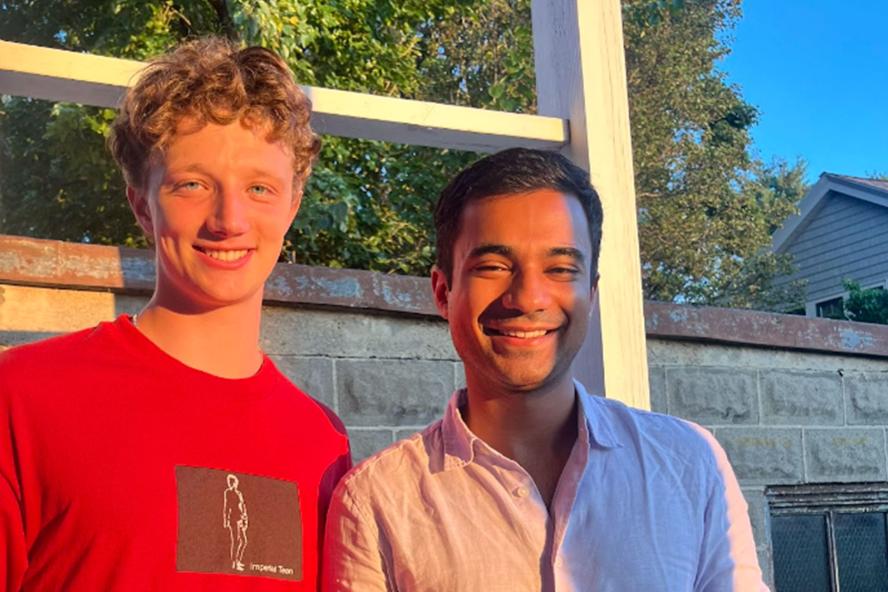Instructor Spotlight: Mihir Sharma and Sam Nashel

Tell us about yourself and what inspired you to teach this course
Mihir Sharma: I came into college not really knowing if I wanted to do law or not, but after taking the ExCollege course, The Right to Privacy during my freshman spring (shoutout to Doug Martland and Steve Sharobem), I totally had my eyes opened to how interesting constitutional law is. That set me down the path of law, and I knew I wanted to be able to explore that interest more deeply, so the most natural thing was to teach through the ExCollege! I’m also on the ExCollege board, so I love the program and wanted to do more. I harassed Sam in Dewick one night to teach with me and we decided to go for it.
Sam Nashel: During my sophomore summer, I had the opportunity to intern with a Federal Defenders office in my hometown in Indiana. I spent the vast majority of the time sitting in the back of courtrooms and attempting to fix the office's printer, but I became inspired by the impact these lawyers had on people who were at their lowest point. Seeing how the law can be a tool for protecting our most valuable rights got me interested in the disparate impact of our legal system. This led to the conception of our class’s focus: how the Supreme Court shapes the rights of such a diverse country. Mihir’s nudge in Dewick has created one of my most formative experiences at Tufts. Thanks, Mihir.
What is one thing about constitutional law that people should keep in mind as we approach the 2024 presidential election?
MS: The next president is almost certainly going to be able to appoint at least one Supreme Court justice, and will definitely fill countless federal judgeships. The importance of this cannot be overstated. It may seem ridiculous and inane that so much rides on the individual morals and politics of 9 individuals, but at the moment it is what it is. Proposals for Court reform are also on the table, and those need to be addressed with urgency too, but right now the individual makeup is crucial. A 5-4 Court versus a 6-3 Court is a huge change.
SN: In the last 40 years, the Federalist Society has sponsored a massive push towards the conservative legal agenda. We have seen the manifestation of their work in recent rulings by the Supreme Court. Overturning Roe v. Wade, affirmative action, and the Chevron doctrine is only the beginning of this push. This upcoming election is an opportunity to lay the groundwork to change the composition of the court and the impact it's having on our rights.
What do you hope that students will take away from your course?
MS: I want the students to leave the class feeling like they can read a newspaper article or something about a court decision and know what’s going on. We both want them to think more deeply about how the Court influences society and government, the scale and scope of its power, and why that can be so good and so terrible. Interest in, and apprehension about, the Court is probably higher now than at any point since Bush v. Gore in 2000, so it’s crucial that people understand how this stuff really works (and more often doesn’t).
SN: The point of our course is not to teach constitutional law or an attempt at early law school prep for freshmen. We want to give the students a framework for critically thinking about the practical implications of esoteric legal philosophies. We’ve intentionally strayed away from the hot button cases of the last few years. Instead, we’re trying to focus on building skills like defending your viewpoints, thoughtfully engaging with different perspectives, and adapting to college in general.
What is something coming up in your course that you are excited about?
MS: Honestly my heart lights up every time a student submits a discussion post and contributes in class; it feels so good! But more specifically, we’re really excited to have the aforementioned Doug and Steve come into class as guest speakers. Doug Martland is a Massachusetts Assistant Attorney General, and Steve Sharobem is an Assistant U.S. Attorney. The class will focus on the Rights of Low Income people. The two cases we have for that week are San Antonio Independent School District v. Rodriguez and City of Grants Pass v. Johnson, about school district funding and the legality of homelessness respectively. Doug and Steve are fantastic teachers and I think their dynamic and presence could really offer something new and exciting for our students.
SN: I’m particularly excited for our Week 8 class about the Rights of Religious and Political Minorities. We spent a lot of time over the summer preparing to talk about legal topics which we had very little familiarity with. This week deals with the Communist Party of Indiana and some interesting legal rulings on anti-communist legislation. But, honestly, I’m excited for every class. Each week has been better than the last. Not only are the students improving the ways they talk about the law, but we’re getting better at getting the students to critically engage with each other.
Sam Nashel (he/him) is a junior from South Bend, Indiana studying Economics and Chinese. He is a captain of the Tufts Mock Trial team, writes for the Tufts Law Review, and is an avid intramural soccer player.
Mihir Sharma (he/him) is a junior from The Hague, the Netherlands double majoring in Economics and History and minoring in English. At Tufts he is a captain of the Mock Trial team, writes for the Tufts Law Review, and tutors with the Petey Greene Program.